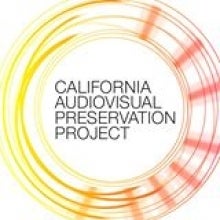First Round of Ethnomusicology Archive Recordings now on California Light and Sound!

The UCLA Ethnomusicology Archive is thrilled to announce that the first 54 recordings from our collections are now available at California Light and Sound Collection on the Internet Archive.
This in thanks to the California Audiovisual Preservation Project (CAVPP). CAVPP is a partnership of 67 libraries, archives and museums developing a new research resource: an online database of film, video and audio recordings documenting California history. The project takes a sampling of media from diverse institutions, digitizes them, and makes them freely accessible.
Please, go check out all 54 recordings (and 50 more are going up by the end of the year) on the Ethnomusicology Archive "channel." You can browse by subject and by name. (And note, the recordings have just gone up, so I'm still working on adding metadata.)
I thought I would highlight a few.
Cahuilla Birdsongs (1987). Fieldwork done by Edith Johnson, Brenda Romero and Gail Schwartz for Amy Catlin's Field and Lab class. Professor Romero tells me that she uses this recording in her classes to this day.
Don Ellis at Ellis Island (club) on the Sunset Strip (1967). The Don Ellis Band plays "In a Turkish Bath" in celebration of the release of "Electric Bath." Ray Neapolitan is on sitar for "In a Turkish Bath." Opening sequence shows the Sunset Strip and includes the following famous clubs: Dino's Lounge, Sneeky Pete's, The Galaxy, The Whisky, Shelly's Manne Hole, and Ellis Island.
We believe this is the only moving image (film) of the Seeger melograph at work!
A World of Music (1972). Observes the activities of students and faculty at the UCLA Institute of Ethnomusicology. The following performance ensembles are included: Music of Java; Music of Bali, with professors Max Harrell and Jozef Pacholczyk playing Indonesian instruments; Music of Thailand, with Professor David Morton (ensemble director) performing ranat ek and students performing on various Thai instruments, Flora Baker, vocalist; Music and Dance of Ghana Ensemble, Kwasi Badu (ensemble director) performing the Asante atumpan drum and students Lynn Carpenter, Jacqueline Cogdell, Philip Harland (sitting and playing apentema drum), Jacquelin Peters (sitting on right playing apentema drum) and Elizabeth Tatar; Los Condores, Music of the Andes Student Group, with Dale Olsen (group leader) playing flute, Linda O'Brien playing guitar, and others; Music and Dance of the Balkans, Miamon Miller, vocalist.
UCLA Ethnomusicology Spring Festival of World Music: Afro-Cuban Music, Francisco Aguabella, Director (June 1, 1997). The legendary Francisco Aguabella (1925-2010) (1992 NEA National Heritage Fellow) was a sacred drummer of the Santeria religion who left Cuba in the 1950s to work with dancer and choreographer Katherine Dunham on the movie "Mambo." He went on to perform with Dizzy Gillespie, Tito Puente, Peggy Lee, Frank Sinatra, Eddie Palmieri, Carlos Santana, the Doors and many others. Aguabella was featured in the documentary "Sworn to the Drum," released in 1995. Jazz legend Dizzy Gillespie said of him, "Aguabella is the John Coltrane of the Conga Drums." Aguabella directed the Afro-Cuban Music Ensemble from 1995 to 2009.
UCLA Ethnomusicology Spring Festival of World Music: Music of Mexico and Mariachi de Nati Cano (May 29, 1999). (Mariachi de Nati Cano begins at 00:41:35.) The legendary Nati Cano (1990 NEA National Heritage Fellow) revolutionized the mariachi sound by blending older, traditional rhythms of mariachi with harmonies of USA and Mexican popular music. The UCLA Music of Mexico ensemble began in the 1960s, making it one of the first mariachi groups to be formed in an academic university setting. The influence of UCLA Ethnomusicology's mariachi is well-known and has been documented by scholars in both Mexico and the USA.





